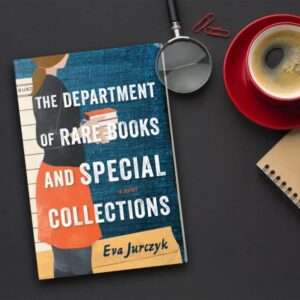March 17, 2022 | Alumni
Eva Jurczyk's mystery novel was inspired by her student job at U of T's Thomas Fisher Rare Book Library

Alumna Eva Jurczyk did a stint working in U of T's rare books library when she was a student at the Faculty of Information.
For readers with ties to the University of Toronto, The Department of Rare Books and Special Collections, the debut mystery novel from librarian Eva Jurczyk (MI 2012), offers more than a whodunnit to solve. On top of figuring out who is responsible for the precious manuscripts going missing from a major university’s library, readers can also try to guess what about U of T's libraries inspired her.
Was that rare book librarian who works on a campus in downtown Toronto really once a spy? Is the university president training for an iron man competition in real life? And would it truly be that easy to replace a precious manuscript with a forgery while surrounded by scholars and subject matter experts?

When Jurczyk, who is an alumna of the Faculty of Information and works as the Humanities Collection Coordinator at Robarts Library, decided to set her novel in the world of libraries, the idea of a mystery followed. She had received advice that a that a previous unpublished novel was “too quiet — which was probably a really polite way of saying it was too boring,” she says, so she set about looking for an environment and a plot line that would keep readers turning the pages.
Readers tend to like libraries and it was a world Jurczyk knew. While she doesn’t work in rare books, she had been a student assistant at the Thomas Fisher Rare Book Library while completing her Master’s in library and information science. As someone who had always been interested in the tales of art forgery and rare book theft regularly chronicled by magazines like the New Yorker and Vanity Fair, Jurczyk thought that such a plot would be a “natural fit” if she was going to use a library setting.
She began to research the topic systematically to understand both the type of person who would steal rare books and the manuscripts themselves.
Often, when the police do catch these thieves, they find the book has just been in someone’s apartment, under their bed... they just wanted it near them
“The thieves are mostly men, often single men. And it’s almost always people on the inside. There’s the occasional ‘smash and grab’ job, but it’s rare. It’s almost never for money because these are things that are incredibly hard to resell. It’s usually somebody who’s just deeply passionate about this material and wants to keep it for himself,” says Jurczyk.
“Often, when the police do catch these people, they find the work has just been in someone’s apartment, under their bed or in their filing cabinet, and they just wanted it near them. And so that’s who steals it — just somebody who loves the work so much that they need to be near it.”
Those are exactly the type of people surrounding Liesl Weiss, Jurczyk’s 60-something librarian sleuth, who, after decades in a background role, suddenly finds herself promoted into the job of her charismatic boss when he has a stroke. The mystery she needs to solve is which one of her quirky colleagues is responsible for the missing manuscripts, a classic Agatha Christie-style plot.
No, she’s never reported to a bicycle helmet-toting executive who was training for an iron man competition
The book, published in January, has proven a success so far. The virtual book tour drew plenty of readers and Jurczyk was thrilled to see her debut novel reviewed in the New York Times Book Review, a rare honour. “It was not only that they reviewed it, but they were very kind about it, which was a dream come true,” says Jurczyk, who has almost finished a non-mystery second novel.
As for the mystery of how much of the characters come from real life, the short answer is bits and pieces. Yes, Jurczyk has worked with vain colleagues and those who used Discmans long past their sell-by date. She “ratcheted up these small characteristics” in her novel, but, no, she’s never reported to a bicycle helmet-toting university executive who was training for an iron man competition and flexed his calf muscles in meetings.
“I can also say with a lot of confidence that I did not ever work with anyone that was stealing priceless manuscripts,” she says, a reminder to those who would believe otherwise that her book is indeed, as it’s billed, fiction.

